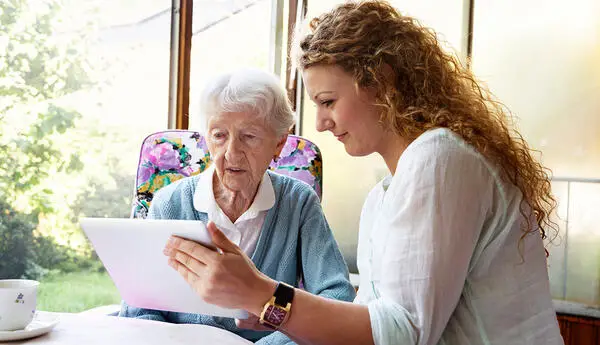
15 Medical Terms for Caregivers: Abbreviations and Acronyms
When you become a caregiver for a loved one who can no longer live a fully independent life, you have to learn a lot of new skills and terms very quickly. The field of medicine and caregiving is extremely complex, and it can be extremely confusing and overwhelming to encounter lots of unfamiliar terms relating to caregiving.
If you’re struggling to understand all of the different terms you’re coming across in your research, you’re definitely not alone!
Here are 15 of the most common acronyms and abbreviations you might need to know as a caregiver.
ALF – Assisted Living Facility
These residential facilities are designed for people who do not need medical or nursing care, but struggle with some of the everyday tasks of daily life, due to age, mobility, and/or chronic conditions. ALFs offer a more “homey” environment than nursing facilities and allow residents to maintain some independence. Some of the tasks assisted living facilities can provide include housekeeping assistance, bathing, dressing, and meals.
AFCH – Adult Family Care Home
An AFCH home is a small group home where residents need help with their daily tasks, but do not require extensive medical care or nursing services. AFCHs usually provide more extensive care than assisted living facilities, but less than a nursing home. Residents do not typically have their own individual units.
DNR Order – Do Not Resuscitate
A DNR is a legal document stating that a person does not wish to be “brought back” should their heart or breathing stop. This is a type of medical order known as an advance directive that instructs medical personnel on a person’s wishes, should they become incapacitated and unable to communicate.
DNI Order – Do Not Intubate
Similar to a DNR, a DNI order is an advance directive that allows for cardiac (heart) interventions, but does not allow a breathing tube to be placed if the patient stops breathing.
HHA – Home Health Aide
A home health aide is someone who comes into a person’s home and helps them with daily tasks that they cannot complete on their own. Generally, these duties involve personal care, light housekeeping, and companionship. HHAs can help people maintain some of their independence.
CNA – Certified Nursing Assistant
CNAs offer similar services to a home health aide — helping with personal care tasks like bathing and dressing. They have more medical training than a HHA and can perform duties like taking vital signs. However, they don’t typically help with tasks like laundry, groceries, and housekeeping.
LPN – Licensed Practical Nurse
A licensed practical nurse has medical training beyond the level of a CNA, and can administer medications, take vital signs, and help with personal care. LPNs must pass a certification exam to become licensed. They work under the supervision of registered nurses.
RN – Registered Nurse
A registered nurse, or RN, is a medical professional who is trained to provide basic medical care, in addition to personal care tasks. RNs are trained in the use of nursing theories to work in a variety of settings, including nursing homes, hospitals, schools, and correctional facilities. When most people think of a “nurse,” they are thinking of an RN.
NP – Nurse Practitioner
A nurse practitioner has advanced medical training and can provide many of the same services as a doctor. Depending on the state, some NPs have full practice authority and can prescribe medications. The nursing profession has evolved significantly, and most people now see a nurse practitioner for some of their health needs.
ADLs – Activities of Daily Life
This term describes the activities that we all must perform on a daily basis to stay independent. These activities can include dressing, getting to and from the toilet, bathing, eating, and moving throughout one’s living space. People need caregiving services of some kind when they can no longer perform ADLs on their own.
IADLs – Instrumental Activities of Daily Living
IADLs are the tasks beyond ADLs that are required for people to live without any assistance from others. They include getting groceries, doing laundry, paying bills, and taking medications properly.
PCS – Personal Care Services
Services that assist with ADLs — helping patients eat, bathe, dress, etc. Caregivers such as family members, home health aides, and nursing assistants typically provide PCS.
DME – Durable Medical Equipment
Equipment for home use that is used more than once. DME can include wheelchairs, crutches, hospital beds, and more. It must be ordered by a doctor to be covered by insurance.
FMLA – Family and Medical Leave Act
FMLA is a federal program that protects a person’s job for up to 12 weeks due to family or medical situations requiring leave. Under the FMLA, workers keep their health benefits.
FCSP – Family Caregiver Support Program
A federal program that provides support to family caregivers, including counseling and respite care.
Ask For Help When You Need It
Caregivers often feel overwhelmed, because they not only have to figure out how to provide care for their loved one (or hire the right people to take on some of these tasks), but they also have to make a huge life change all at once.
If you’re scrambling to manage your own life while taking over caregiver duties, then you’re probably dealing with a lot of stress. Don’t feel like you have to do it all on your own! There are organizations, support groups, and resources out there to help you so you can ensure that your loved one has the care they need without it taking over your entire life.